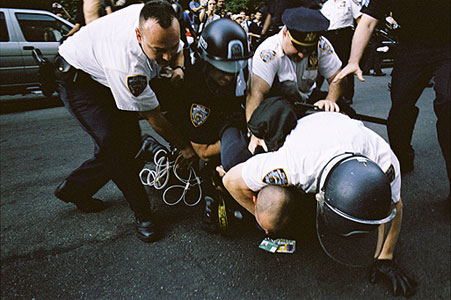During the Republican National Convention photographer Theo Rigby was arrested by the police. Mr. Rigby, who photographed the story “Twin Soldiers: An American Story,” published on our Web site, had traveled to New York in part to continue photographing the surviving members of the Medina family. They had come to protest US government policies. Irving Medina, one of the twin soldiers, had died in Iraq serving in the US Army; Ivan Medina, also a member of the Army, had survived. Mr. Rigby, while photographing another protest, was arrested. He describes what happened below. “Twin Soldiers: An American Story,” can be read by clicking here. |
| Forty
Hours Behind Bars by Theo Rigby |
| On August 31
an impromptu protest, marching band and all, left Union Square. It
was the second day of the Republican National Convention and, a freelance
photographer, I was in New York to cover the Convention. I followed
the crowd. The small but loud group of about four hundred protestors
and press turned down East 16 Street and were almost immediately blocked
by a line of riot police. Within seconds, another line of police blocked
the other end of the street. There had been no order to disperse and
there was no chance to leave. I was thrown to the ground while photographing
an arrest, landed on my elbow, and scrambled away before a group of
police could pile on me. I sprang upright and glanced in both directions
for an opening to flee, as the cops were starting to get violent.
There was no hole to escape. Twenty minutes later I was sitting on the sidewalk with my hands behind my back and plastic handcuffs around my wrists, seemingly tightening every minute. On that day, 1187 people were arrested and it was blatantly obvious that the NYPD was utterly unprepared for the mass arrests. It was a routine of come over here, go over there, sit down, move twenty feet over here, stand up, then “I told you to sit down!” Cell phones rang and rang as our hands were locked together, and some cops chuckled and yelled, “Why don’t you answer it?” Five hours passed, still handcuffed, before the battered crowd was dumped into the now infamous Pier 57. Pier 57, or “Guantanamo” as it was aptly named, is a former bus garage that was converted into a detention center for the RNC. Cages replete with fifteen-foot-high fences with razor wire at the top were constructed to hold the prisoners. The floor was soaked with motor-oil, anti-freeze and grease. When I put my hand on the ground, my palm came back up with a thick layer of black material that soon soaked into my skin. Benches were scarce and the toxic floor quickly blackened the crowd. There was no food, limited water, no lawyers, no phone calls. Nobody read us our rights; we just sat there. Protestors were reportedly treated for chemical burns, allergic reactions, skin infections, rashes and welts caused by the unhealthy conditions. My throat slowly tightened and I started to cough. |
 Another photographer is arrested, August 31, 2004. © Photograph by Theo Rigby |
As hours passed the scene grew from loud and angered to tired, sick and dirty. Bodies were strewn across the black floor, some curled up in the fetal position, some hunched over against the fence and many milling about, seemingly lost. I met a middle-aged Indian woman who had been in a bookstore, walked out and gotten arrested. “I showed them the receipt,” she said. I also met a 22-year-old young man who was on his way home to New Jersey from work and was swept up in a mass arrest near the convention. At 7 am on Wednesday morning, three hours before his shift started, he told me, "I hope I don't get fired." Then there were the two sixteen year-old girls who had been shopping in Macy's department store, walked outside, and a cop shuffled them towards the corner. They were arrested for protesting and brought to Pier 57 as they clutched their shopping bags. At some point the police threw mini-boxes of cereal over the razor wire and lofted small containers of milk into hungry hands. We devoured the food and an hour later there was a peace sign, 30 feet wide, made out of empty cereal boxes, milk cartons, cups, and random pieces of paper. In large letters made of toilet paper, one prisoner spelled out FREEDOM. After I had been at Pier 57 for sixteen hours, at 4 pm, the police transported us to central booking and I was crammed into a jail cell. There weren’t enough seats and many had to stand. Hours slowly passed and I was moved into another cell, then another, and eventually it was 4 am. After two sleepless nights I finally drifted asleep sometime on Thursday morning. Then I heard, in a gruff voice, someone say “Theo Rigby.” I wearily stood up, was shackled once more and took the option to receive a Desk Appearance Ticket, obliging to come to court in a month. Then I was released into the blinding sunlight on Thursday at 10 am, forty hours after being first handcuffed. There is going to be a class action lawsuit against the New York Police Department, and blackened clothes from Pier 57 are being tested for toxic material. One source reported that the city may have to pay each prisoner $1,000 per hour, for each hour exceeding twenty-four hours of incarceration. Throughout my detainment I never spoke to a lawyer. I was charged with disorderly conduct, a violation equivalent to a parking ticket. All I had wanted to do was to take photographs. |
| Twin Soldiers: An American Story |